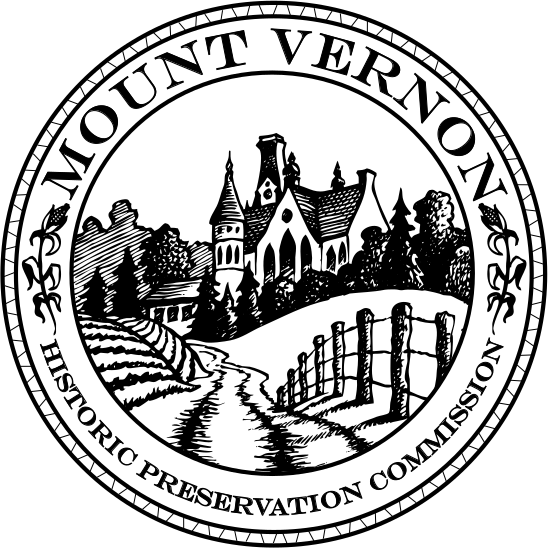NOTE: Below is an adaptation of the MVHPC’s newsletter for May, 2020.
Cleaning Out
Please Keep Us in Mind!
Fewer demands and more time at home have motivated many of us to delve into some serious house cleaning, especially focusing on areas that don’t normally get much attention. As you battle those dust bunnies and sort through closets and drawers, you may uncover some long forgotten historical treasures. Please keep Mount Vernon Historic Preservation Commission (MVHPC) in mind. We’re especially interested in the following topics:
1. Cookbooks – Over the past century, many organizations and churches in Mount Vernon have gathered recipes from members and published them, essentially preserving and documenting the culinary heritage of the town. These cookbooks often contain family recipes, ethnic dishes, and history about the organization or area businesses. HPC is looking for Mount Vernon cookbooks (pre-1970). If you have Mount Vernon cookbooks or old Mount Vernon menus, please consider loaning them to HPC. They’ll be scanned and added to the Mount Vernon Cookbook Collection on the MVHPC website.
2. Women’s Suffrage in Mount Vernon – The 19th Amendment to the United States Constitution became law in August 1920, making it illegal to deny the vote based on a person’s sex. Iowa was the tenth state to ratify the amendment when it did so in July 1919. Please consider sharing any resources you may have (scrapbooks, postcards, correspondence) that document Mount Vernon’s participation in the fight for the vote and women’s political activism before and after 1920.
3. Kit Homes – Between 1908 and 1940, mail-order houses were shipped to all 48 states and several other countries. Sears is probably the best known of the catalog homes; however, other companies such as Aladdin, Montgomery Ward and the Gordon-Van Tine Co. (located in Davenport, Iowa) also provided kit homes. The framing members for these homes – joists, rafters and studs – were precut and ready to be nailed into place. Each piece of lumber was stamped with a letter and numbers to facilitate assembly. It requires some detective work to authenticate a kit home. Some signs to look for are: stamped lumber in the basement or attic, shipping labels attached to lumber, original building permits, and relevant documents (Sears sent a 75-page leather-bound instruction book, with the homeowner’s name embossed in gold on the cover, and gave precise directions on the proper placement of those 30,000 pieces of house.) More tips for authentication may be found at http://www.arts-crafts.com/archive/kithome/rt-searskits.shtml.
If you have items you’d like HPC to consider, please contact Mary Evans at [email protected] or 319-310-2896.
Unforgettable
Class of 2020
There’s no doubt that not only this year, but also the class of 2020, will be unforgettable. Even though many events have been postponed this spring – we’re not going to let a pandemic stop us from creating and sharing memories.
Since we can’t be together face to face, MVHPC invites Mount Vernon High School seniors to participate in a virtual oral history project.
Connect with a family member, friend or neighbor and record an interview about your senior year and how it compares to theirs. Some of you may be able to include several generations of Mount Vernon alumni. (However, your interview participants don’t have to be Mount Vernon graduates.)
Follow these easy steps:
- Make sure that everyone participating in the interview is comfortable with having their responses shared online. Your video will be shared on MVHPC’s Facebook page.
- Come up with an introduction and a short list of open-ended questions to inspire storytelling. Use questions that will illustrate the differences between each person’s senior year experiences.
- Select your method of recording the interview (Zoom or another application).
- Upload the video of your interview to your Facebook page and tag Mount Vernon Historic Preservation Commission. If you don’t have a Facebook page, you may email your video to Grace Chamberlain Rowray at [email protected].
- Be creative and have fun! What a great way to capture your stories and preserve them for a lifetime!
Thank you for your interest and participation. We can’t wait to see and hear your stories!
From the Mount Vernon Hawk-eye, October 10, 1918
MUST REPORT CASES
The city authorities received information yesterday from state officers that all cases of Spanish or epidemia influenza must be reported. Physicians and private individuals report to the mayor, and the mayor in turn reports to the state board of health. Physicians are not to report direct, that there may be no duplications. The order is one emanating primarily from national authorities at Washington, D.C., and is in line with the universal effort to in every way possible control and minimize the spread of the epidemic.
Sheltering in This Place
Historic Mount Vernon
This extraordinary time, and wherever we spend our shelter in place, will remain as a profound memory for most of us. In response to loss or threat, our homes and the familiar places of our lives can give us comfort, solace, and a sense of security.
Paul Edmondson, president and CEO of the National Trust for Historic Preservation, wrote about the way we can turn to historic places—whether our homes, our neighborhoods, Main Streets, or historic sites—to provide the perspective that we have met challenges before and have come through.
“Historic preservation is about the way we ascribe meaning to historic places and is therefore ever changing. Heritage is not the buildings or landscapes; it is the meanings we give the buildings and landscapes. These historic places of quarantine suddenly feel more significant because of what we can learn from them to help us today in our present crisis.”
During this time of quarantine, more people are spending time outdoors, walking, jogging and biking through the community. The beautiful spring weather provides an opportunity to watch the progress of gardens, note the slow unfurling of green and remind us how beautiful our little town is.
A special places mapping workshop, called Historically Speaking**, was held in Mount Vernon in 2011. Workshop participants described their own favorite historical sites. Among them were: Old Lincoln Highway, Old Interurban Route, Brick Street and Railroad Overpass, Davis Park, 3 Historic Districts (Ash Park, Cornell College & Commercial), Pres Hill, Old Middle School, Cemetery, Old Limestone Quarry (Nature Park) and Hillcrest Country Club (one of oldest public courses in Iowa).
The following comments were noted:
“I like the countryside atmosphere around Mount Vernon.”
“We like to hang out at Ink Pond and stand around talking and catching frogs.”
“The old train bridge is so unique. It is always a destination during our family bike rides.”
“The houses up the hill from Cornell College –Oh how I love them!”
“Every 20 minutes a train goes through and the noise used to annoy us. Now it is a comforting sound—like a community rhythm.”
“[There is a] beautiful, historic, and social culture with front porches on older homes.”
“Davis Park is constantly used and has three 120 year old cottonwoods.”
“I especially love the path behind the old middle school when phlox are in bloom. It is just so beautiful!”
Enjoy our historic town during this historic time. Take advantage of the opportunity to explore and learn more. Find comfort in knowing that you are part of this place and its historic heritage reminds us that we have been through quarantines and epidemics before. Now more than ever, we look to our history and our home for courage, comfort, and inspiration.
*** More information about the workshop and the entire Mount Vernon Community Visioning report that it was part of –including preferred walking, biking and running routes—may be found by going to www.cityofmtvernon-ia.gov and typing ‘historically speaking’ in to the search bar. ***
Preserve Iowa Summit
Join Us Online
This year, Iowa’s statewide annual conference for historic-preservation is will be entirely online.
State and national experts will offer a range of online sessions. You may find a schedule for the three day event at: https://iowaculture.gov/history/preservation/education-and-outreach/preserve-iowa-summit

